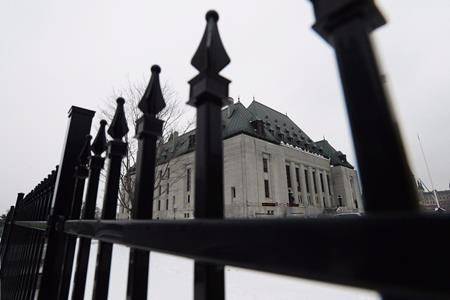Sharing a computer with someone does not mean giving up privacy rights over the material stored on the machine, the Supreme Court of Canada has ruled.
In a 9-0 decision Thursday, the high court restored the acquittal of Thomas Reeves of Sudbury, Ont., on child-pornography charges — even though his common-law spouse had consented to police seizure of a jointly used computer from their home.
In October 2012, police arrived at the home without a warrant after Reeves’ spouse reported finding what she believed to be child pornography on the computer.
The ruling said that although the couple shared the computer, Reeves had a reasonable expectation of privacy concerning its contents.
Section 8 of the Charter of Rights and Freedoms protects Canadians against unreasonable search and seizure, including cases where police have found evidence of criminal activity.
The court found the warrantless seizure of the computer and a later search of it with a flawed warrant were unreasonable, meaning the child-pornography evidence should be disallowed. Permitting the evidence would “bring the administration of justice into disrepute,” the ruling said.
Although the decision was unanimous, two of the nine judges provided their own rationales.
The majority reasons by Justice Andromache Karakatsanis said the case affects the privacy rights of all Canadians who share computers with others.
“Shared control does not mean no control,” she wrote.
“We are not required to accept that our friends and family can unilaterally authorize police to take things that we share. The decision to share with others does not come at such a high price in a free and democratic society.”
Deciding otherwise could disproportionately affect the privacy rights of low-income people, who might be more likely to share a home computer, she added.
Child-pornography offences are “serious and insidious” and there is a strong public interest in investigating and prosecuting them, the decision said. However, in applying charter rights, the question is not whether a person broke the law, but whether the police exceeded the limits of the state’s authority.
The Reeves case unfolded after he was charged with domestic assault and a no-contact order was issued that barred him from entering the family home without his spouse’s written consent.
When she contacted Reeves’ probation officer to withdraw consent, she reported the presence of the apparent child pornography on the computer, prompting the police visit.
Police held the computer without a warrant for more than four months without searching it, and failed to report the seizure to a justice despite a legal requirement to do so.
After eventually obtaining a warrant to search the computer, they found 140 images and 22 videos of child pornography. However, a judge ruled the warrant should not have been granted because the information used to obtain it was misleading and unfair.
The judge excluded the computer evidence, given the initial warrantless seizure, the lack of required reporting and the eventual reliance on a flawed warrant. However, an appeal court said the evidence should be allowed and ordered a new trial. Reeves then took his case to the Supreme Court.
Jim Bronskill, The Canadian Press



